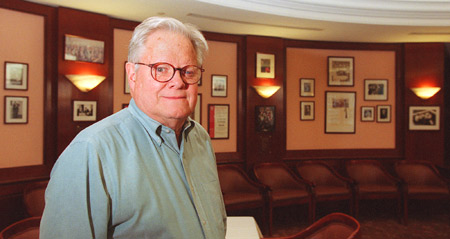Long view needed in Afghanistan
Former UN ambassador Moore sees history of trouble a cause for hope

The toughest problem facing the U.S.-led operation in Afghanistan is not bombs, bunkers, or refugees, but the depth of its own resolve, according to former Institute of Politics Director and former U.S. Ambassador to the United Nations Jonathan Moore.
The international community is so far saying all the right things regarding inclusion of all factions in a process of stabilization and recovery, said Moore, who is currently an associate at the Shorenstein Center on the Press, Politics, and Public Policy, and a consultant with the United Nations Development Program.
But the international community has said the right things before, Moore added. It has even, on occasion, followed through, helping set up recovery programs and establishing transitional governments. But it has also tended to push through democratic elections too soon, Moore said – and then walk away.
“It’s as bad or worse [in Afghanistan] as any other country,” Moore said. “[The recovery effort] is going to cost more than $10 billion if it’s going to be serious. … For a country to build itself up from extreme poverty and the rubble of a war to a viable society takes a very, very long time.”
Promises not kept
Moore’s own experience, which includes service as U.S. coordinator for refugees for the State Department, has provided him ample evidence of the long-term nature of recovery. Over the years, he has worked in many of the world’s war-torn regions, including Cambodia, Somalia, Rwanda, Kosovo, Haiti – and Afghanistan after the Soviet Union left and before the Taliban took power. Common to the different situations in those countries, Moore said, is a reluctance by the developed world to recognize the depth and duration of the effort needed to get those countries on their feet.
“The donor nations have a long history of promising a lot and then not doing it,” Moore said. “The international community isn’t willing to devote enough political support and financial resources over long enough time to seriously address – rather than solve – these problems.”
Despite that past history, Moore said so far things appear to be going as well as possible in Afghanistan. The first phase, involving military strikes, is nearing an end. As that winds down, the second phase, getting emergency humanitarian aid to the needy, is ramping up. Also under way are efforts to form a transitional government and a transitional security force.
Once those things are created, the nation enters the recovery phase, which Moore said is the longest, most difficult – and most important – part of the process.
Recovery involves the repatriation of refugees and reintegration of former soldiers into the economy. In a country like Afghanistan, from which many of the nation’s elite have fled and where constant war has destroyed much of its infrastructure, economic efforts will begin at a very elementary level: providing seeds, tools, and mine-free fields so former soldiers and refugees can begin farming. Job creation is next, but even vocational training can be difficult for a population that contains large numbers of people with little formal education.
“How do they have a life? How do they get jobs? How do they get access to social services?” Moore said. “We’ve got to help the place help itself, make itself strong enough to give people hope and enough to live with in their lives so they don’t slip back into hell again.”
Tired of trouble
The history of inter-tribal strife in Afghanistan, coupled with the massive humanitarian and development effort that will be needed, doesn’t paint a hopeful picture of the nation’s future.
“If you look at the conflicts of interest [that exist] and look at the history of these factions not getting along together, then you say, ‘God, can this be done?’” Moore said. “It’s a characterization of the human species that we make war better than we make peace. It’s much easier to make war than to make peace.”
But Afghanistan’s sad history itself may be a cause for hope, Moore said. In other countries, such as the southeast African nation of Mozambique, years of incessant war finally led to peace in 1992, mainly because people just got tired of the fighting.
“People got exhausted in Mozambique and said. ‘We just don’t have the energy to fight anymore,’” Moore said. “People see that fighting hasn’t gotten them anywhere.”
The Afghan people’s fatigue from the years of fighting, combined with sustained recovery efforts and intense international pressure for the factions to put aside their differences, may make the difference, Moore said.
“If the conditions are as dire in Afghanistan as I believe they are, there’s got to be a tremendous effort to find the common ground…. That combined dynamic [of fatigue and pressure] might work,” Moore said. “That is what the wager is.”




